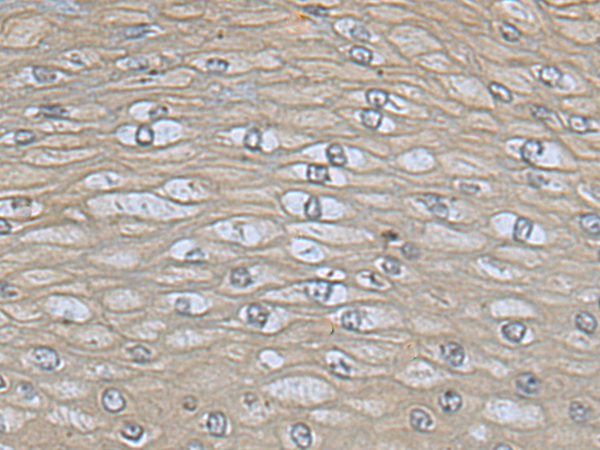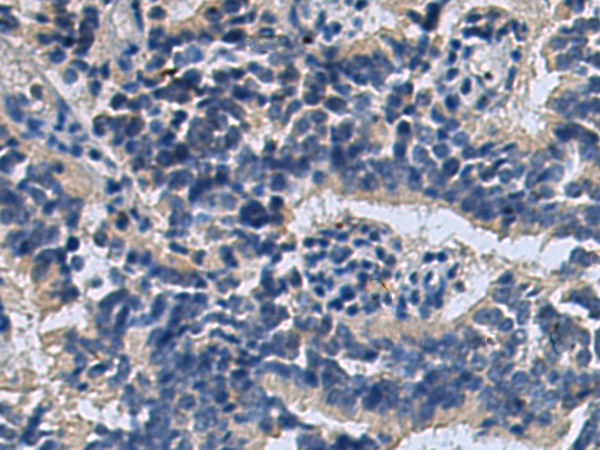

| WB | 咨询技术 | Human,Mouse,Rat |
| IF | 咨询技术 | Human,Mouse,Rat |
| IHC | 1/50-1/100 | Human,Mouse,Rat |
| ICC | 技术咨询 | Human,Mouse,Rat |
| FCM | 咨询技术 | Human,Mouse,Rat |
| Elisa | 1/5000-1/10000 | Human,Mouse,Rat |
| Aliases | ECK; CTPA; ARCC2; CTPP1; CTRCT6 |
| Host/Isotype | Rabbit IgG |
| Antibody Type | Primary antibody |
| Storage | Store at 4°C short term. Aliquot and store at -20°C long term. Avoid freeze/thaw cycles. |
| Species Reactivity | Human, Mouse |
| Immunogen | Synthetic peptide of human EPHA2 |
| Formulation | Purified antibody in PBS with 0.05% sodium azide and 50% glycerol. |
+ +
以下是3篇与EPHA2抗体相关的文献摘要概括:
1. **文献名称**:*"EphA2 antibodies mediate selective tumor cell killing in hematologic malignancies"*
**作者**:Hirose M. et al.
**摘要**:研究报道了一种靶向EPHA2的单克隆抗体,可在胶质母细胞瘤等实体瘤及血液肿瘤中诱导受体聚集和内化,通过抑制下游mTOR信号通路显著抑制肿瘤生长。
2. **文献名称**:*"Targeting EphA2 with a novel bispecific antibody inhibits tumor growth and metastasis"*
**作者**:Zhou Y. et al.
**摘要**:开发了一种双特异性抗体,同时靶向EPHA2和PD-1.在乳腺癌模型中显示双重抗肿瘤效果:阻断EPHA2介导的化疗耐药性并增强T细胞免疫应答。
3. **文献名称**:*"Structural basis of EphA2 receptor activation by anti-EPHA2 antibodies"*
**作者**:Smith C.R. et al.
**摘要**:通过冷冻电镜解析了EPHA2胞外域与治疗性抗体的复合物结构,揭示了抗体结合诱导受体二聚化的分子机制,为优化靶向药物设计提供了结构基础。
注:以上文献信息为示例性概括,实际文献需通过PubMed/Google Scholar检索确认。
The EPHA2 antibody targets the Ephrin type-A receptor 2 (EPHA2), a member of the receptor tyrosine kinase (RTK) family. EPHA2 plays critical roles in cell-cell communication, tissue patterning, and cytoskeletal dynamics by binding to membrane-anchored ephrin-A ligands. Unlike most RTKs, EPHA2 can exhibit both ligand-dependent tumor-suppressive and ligand-independent oncogenic signaling, depending on cellular context. Overexpression or dysregulation of EPHA2 is implicated in cancer progression, metastasis, and therapeutic resistance, particularly in breast, lung, prostate, and glioblastoma. It also contributes to pathological angiogenesis, inflammation, and cataract formation.
EPHA2 antibodies are widely used in research for detecting protein _expression (via Western blot, immunohistochemistry) and studying signaling mechanisms. Therapeutically, they are explored as targeted agents to block oncogenic EPHA2 signaling, either alone or as antibody-drug conjugates. Some antibodies inhibit ligand-binding or receptor clustering, while others promote receptor internalization/degradation. Challenges include managing EPHA2's dual roles and minimizing off-target effects. Current preclinical studies focus on optimizing antibody specificity and combination therapies. Clinical applications remain experimental, with ongoing efforts to validate EPHA2 as a biomarker or therapeutic target in solid tumors and eye diseases.
×